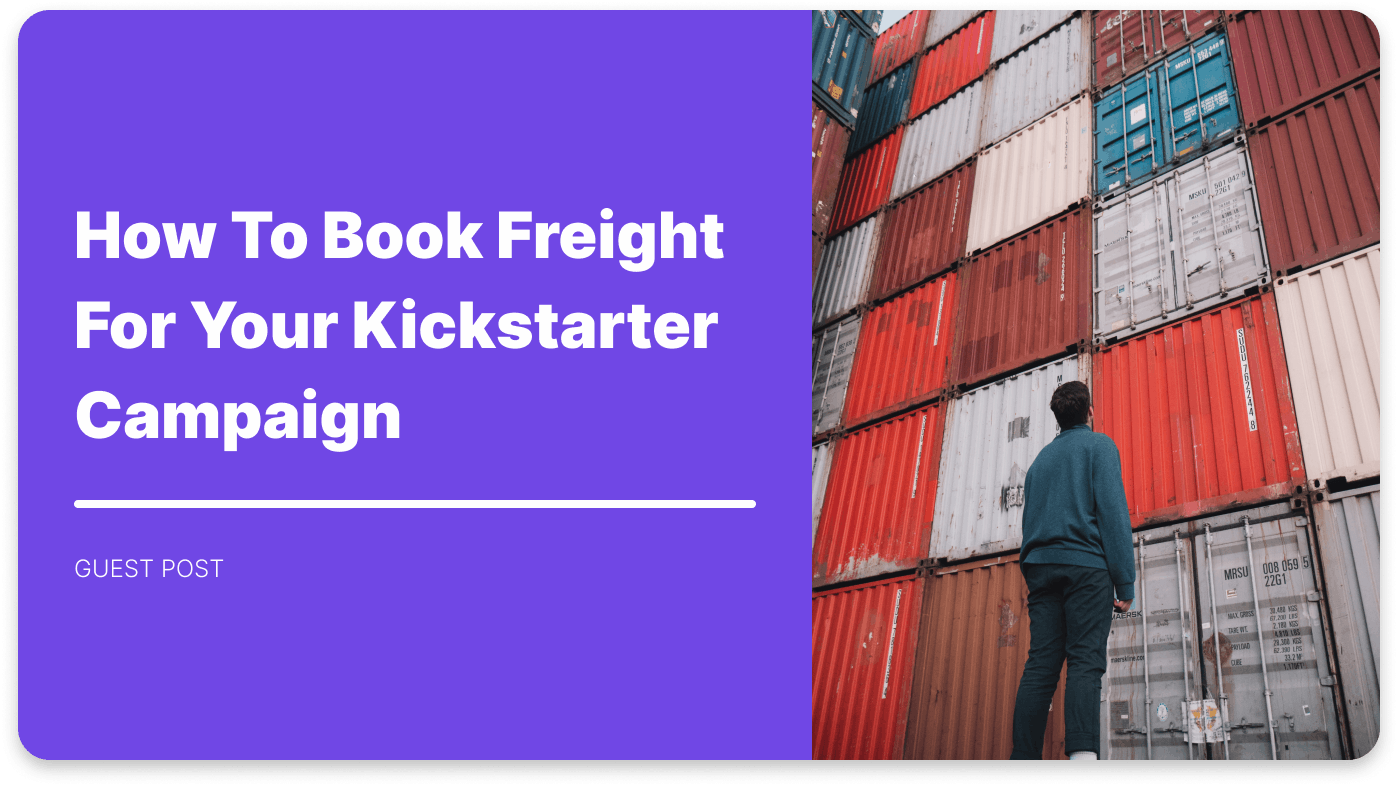How To Book Freight For Your Kickstarter Campaign

Launching a Kickstarter is one thing. Fulfilling it is another.
To do so requires finding a manufacturer and sending orders to backers. It also requires freight shipping, which has been in the news a lot lately because of delays and high costs.
A lot of Kickstarter creators are intimidated by freight shipping in particular because it seems so foreign. But once you get past the initial shock of headlines and complex jargon, booking freight is not terribly complicated.
Ultimately, booking freight for your Kickstarter campaign is going to come down to four key decisions. Here’s what you need to know.
1. Choose a freight broker or freight marketplace
There are two ways you can book freight: find a broker or use a marketplace.
If you hire a freight brokerage firm, they will ask you a few questions and will take care of the rest. It’s kind of like how travel agents helped people book vacations before they could book airline tickets and hotel rooms online.
Similarly, freight marketplaces help you book freight in the same way that Expedia helps you book hotels. We recommend checking out Freightos.
No matter which freight marketplace you choose, the basics remain the same. You will enter information about your shipment, pickup and delivery location, and customs information. Then you will select a shipping option based on the available quotes.
2. Determine the right shipping terms
If you work with freight shipments, you will likely come across incoterms. Incoterms are the rules that decide what the buyer and seller are responsible for when it comes to freight shipping.
The four most common terms are EXW, FOB, DDU, and DDP. Here’s what they would mean for you:
- EXW, or Ex Works: The seller - your manufacturer - relinquishes all responsibilities for the goods once they’re done manufacturing them. You are responsible for getting someone to pick them up.
- FOB, or Free On Board: The seller is responsible for getting goods onto a shipping vessel. Then you take on responsibility from there, which includes handling the import process and arranging local transportation of goods once they depart from the vessel.
- DDU, or Delivery Duty Unpaid: The seller handles the entire freight process, except for customs, which you pay.
- DDP, or Delivery Duty Paid: The seller handles the entire process. You have nothing left to worry about.
If your manufacturer insists on EXW or FOB terms, that’s when you will need to book freight. Freight brokers and marketplaces alike have processes for handling any incoterms - just check with your manufacturer so you know which one applies to you.
3. Calculate customs costs
If you are importing goods from another country, you will likely need to pay customs. This consists of two broad categories of charges:
- Duties and tariffs.
- Safety exams.
For duties and tariffs, you will be charged a certain percentage based on the HS Code of the goods you are importing, the country the goods are coming from, and the country where they are going.
To calculate what you can expect to pay, look up your HS Code here. Then use that code, along with some other information, to calculate your import duty and taxes.
There is also the possibility that your goods will be stopped by customs and inspected. This often happens at random. Customs officials may run the goods through X-ray machines, open the containers, or even inspect the goods themselves. If this happens, you will need to pay the cost of the exam, which varies based on what is done. (Personally, I’ve had a shipment of board games inspected by X-ray machine in 2020 and it cost about $600 USD).
4. Choose transportation mode
There are four forms of transportation for freight shipping: air, sea, rail, and road. Your shipment will probably be sent by some combination of the four, but the largest stretch will almost certainly be done by either air or sea.
Sea shipping is much cheaper, but also much slower. It often takes several weeks or even months to ship items from China to the US, for example. Times have been skewing longer, too, because of recent supply chain disruptions.
Air shipping, on the other hand, costs much more than sea shipping, but deliveries are often made within a couple of weeks or even days.
If your items are perishable, air shipping is your only practical choice. Likewise, if eco-friendliness is your main concern, sea shipping is almost certainly the way to go.
Ask your freight broker or check out several quotes on a freight marketplace. From there, you can determine whether or not fast shipping is worth the additional cost.
Final Thoughts
Booking freight seems intimidating, but it really comes down to a few key choices. Most of the work centers around choosing a freight broker or marketplace, learning your shipping terms, planning for customs charges, and picking a form of transportation. Once you do that, the hardest part is waiting!
Overwhelmed with your Kickstarter? Check out Fulfillrite's free Kickstarter checklist. It lists everything you need to know to get your Kickstarter campaign shipped.

Brandon Rollins is a Marketing Consultant at Fulfillrite. His main areas of expertise are online marketing and supply chain management. He also runs Pangea Marketing Agency and writes for Weird Marketing Tales.

